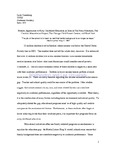Holistic Approaches to Early Childhood Education as Seen in The Perry Preschool, The Carolina Abecedarian Project, The Chicago Child Parent Centers, and Head Start

View/
Author
Greenberg, Leah
Subject
Washington and Lee University, Shepherd Poverty Program
Early childhood education
Head Start programs
Education, Preschool
Perry Preschool Project (Ypsilanti, Mich.)
Poverty
Children -- Nutrition
Children -- Health and hygiene
Health education
Holistic education
Child-Parent Center Program (Chicago, Ill.)
Metadata
Show full item recordDescription
Leah Greenberg is a member of the Class of 2005 of Washington and Lee University. Capstone; [FULL-TEXT FREELY AVAILABLE ONLINE] Simple educational preschool programs are often not enough to compensate for the negative aspects of poverty. Evidence from “compensatory and regular preschool programs generally indicates weak and inconsistent effects on IQ and achievement” (Armor, 95). The results for programs that incorporate family support initiatives are much stronger. This is because problems associated with poverty and poor parenting can be harmful to children's emotional health. Poor emotional health can have the same negative impact on cognitive development as poor physical health. E.C. Frede writes that the most beneficial early childhood programs are those which combine a number of different factors. These include “class size, the ratio of children to teachers…reflective teaching practice and close relationships with parents, and curricula that serve as a bridge between home and school” (95). I will first address programs that deal with children's health. Next, I will look at classroom dynamics and different methods of teaching. Finally I will examine different programs which involve a parental aspect. [From introductory section] Leah Greenberg